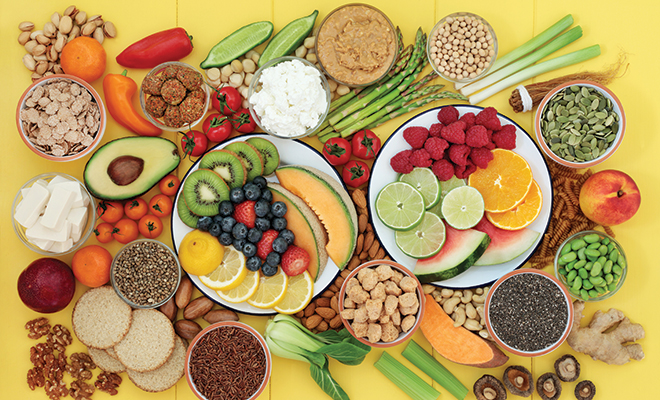
Heart-Healthy Suggestions for Foodies
The American Heart Association’s heart disease and stroke statistics of 2019 report that one of three deaths in the United States was heart disease related. That’s a staggering statistic. A healthy lifestyle is your best weapon in the fight against heart disease and stroke. Nevertheless, heart-healthy changes do not have to take the fun out of being a foodie; they can only enhance it!
As a rule, a heart-healthy diet should focus on whole grains, healthy fats, lean sources of protein, and a rainbow of fruits and vegetables while minimizing refined carbohydrates, sugar and saturated fats. However, certain foods are particularly heart-smart because they have links to healthier arteries, lower cholesterol, lower blood pressure and reduced inflammation.
Heart Smart Diet
Of the many diets designed for optimal heart health, one of the most popular is the Mediterranean diet, which consists of the traditional cuisine of countries bordering the Mediterranean Sea. Its main components include daily consumption of vegetables, fruits, whole grains, nuts, seeds and healthy fats; weekly intake of fish, poultry, beans and eggs; low to moderate portions of dairy products; limited intake of red meat and spices. Other important elements of the Mediterranean diet are dining with family and friends, enjoying a glass of red wine and being physically active.
The plant-based trend also promotes the heart-healthy way of life as more people choose to move away from beef, pork, poultry and dairy on a regular basis and make a conscious decision to eat more plant-based foods. The change in focus means you’re eating more fruits and vegetables, whole grains, plant-based oils, nuts and legumes, therefore enhancing your diet as well as your heart!
What About Fats?
In the past, all dietary fats got a bad rap. A nutritious eating plan does not mean cutting out all fat, just focusing on the healthier varieties. A good start is to swap foods higher in saturated fat for foods higher in unsaturated fat. Saturated fat comes from animal sources such as meats, poultry, fish and dairy as well as coconut oil. However, some sources of saturated fat such as fish contain Omega3 fats and offer many health benefits, such as promoting normal functions of the brain and nervous system; lowering cholesterol levels and supporting heart health; protecting against dry eye disease; and reducing inflammation in the body. Food sources of Omega3 fats include salmon, herring, sardines, walnuts, flaxseeds, chia seeds, hemp seeds and fortified eggs.
The two main unsaturated fat sources, monounsaturated and polyunsaturated fats, help to increase HDL levels, the “good” cholesterol in the body. Start by adding more plant-based fats such as nuts or nut butters, seeds, oils and avocados to your diet to boost that good cholesterol. Avocados not only contain monounsaturated fat, but are packed with dietary fiber, potassium and vitamins. Add them to salad, pizza, soup, salsa, eggs and sandwiches. Enjoy avocado spread on toast for breakfast! Plus, as a cheese replacer, avocados provide the yummy creaminess of cheese minus the saturated fat.
Use Spice, Not Salt
Eating too much sodium can increase risk for high blood pressure, which can lead to heart disease and stroke. When you’re cooking, season with lemon or lime juice, fresh herbs or salt-free herb blends and vinegar to boost flavor. Surprisingly, the salt we add during cooking and at the table accounts for only a small percentage of our daily sodium. The main delinquents are packaged and processed foods. Choosing more fresh or frozen options is the heart-smart way.
The Foodie out on the Town
When dining out, it’s important to understand the information on the menu to ensure that the meals you eat away from home are part of a healthy diet and still delicious!
Fried, au gratin, crispy, scalloped, pan-fried, sautéed, buttered, creamed or stuffed are high in fat and calories. Look for steamed, broiled, baked, grilled, poached or roasted foods. Choose entrees that feature seafood, chicken or lean meat and avoid fatty meats.
Ask for condiments to be served on the side. Control your portions. If there are small plate options, opt for those over a plate that may tempt you to overeat. Ask your server how particular foods are prepared or what ingredients they contain.
For more heart-healthy information on reducing your risk for heart disease, consult a registered dietitian nutritionist in your area. ■
Sources: eatright.org, heart.org, consumerreports.org, newjersey.heart.org and www.nhlbi.nih.gov.
Heart Healthy Swaps in the Kitchen
• Try 90 percent lean ground beef or lean ground turkey breast instead of regular ground beef.
• Substitute plain yogurt for sour cream on tacos or in dips.
• Try oils such as olive, safflower and other plant-based oils instead of butter or margarine or reduce how much butter you use.
• Swap mustard, yogurt or avocado for mayonnaise.
• Instead of crackers, chips, candy or baked goods, try fruit with plain yogurt, fresh vegetables and hummus, a slice of whole wheat toast and natural peanut butter or nuts.







